Veranstaltungen und Aktivitäten
Nora Kottmann nimmt an Förderungsprogramm „Zia – Visible Women in Science“ teil
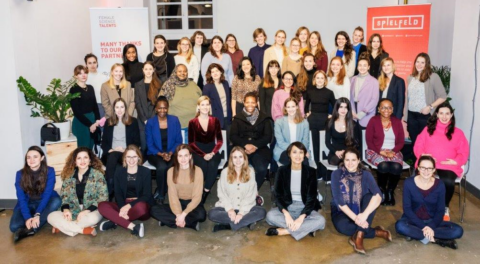
Um Frauen in der Wissenschaft noch sichtbarer zu machen, hat der Zeitverlag Gerd Bucerius GmbH das Förderungsprogramm „Zia – Visible Women in Science“ initiiert. Förderinstitutionen sind das Deutsche Zentrum für Luft- und Raumfahrt, die Hochschulen Bonn-Rhein-Sieg und Ruhr West, die Universitäten Heidelberg, Köln und Potsdam, der Hochschulmedizin Deutschland e.V., das Berlin Institute of Health und die Max Weber Stiftung. Für den Förderplatz der Max Weber Stiftung, der das Deutsche Institut für Japanstudien angehört, wurde Nora Kottmann ausgewählt. In den kommenden zwölf Monaten wird sie Gelegenheit haben, an Fellow-Netzwerktreffen mit Förderern, Netzwerkpartnern und Role Models sowie drei Live-Workshops teilzunehmen. Im Fokus der Initiative stehen interdisziplinäre Vernetzung, Austausch, individuelle Entwicklung, Sichtbarkeit und voneinander Lernen. Mehr Informationen zum Programm finden Sie in der Pressemitteilung des Zeitverlags hier
Join the DIJ team as librarian (application deadline: 20 February)
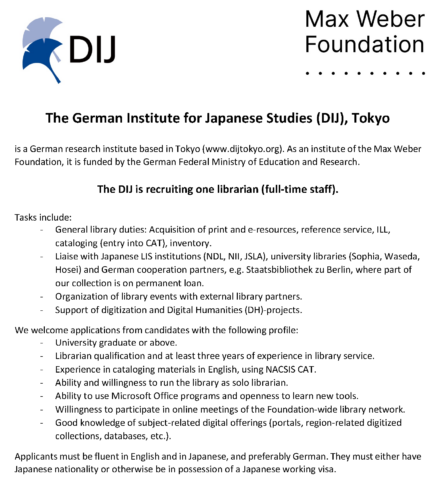 We are recruiting one librarian (full-time staff) for our DIJ library. Tasks include general library duties, liaison with Japanese and German cooperation partners, organization of library events, support of digitization and Digital Humanities projects. We welcome applications from qualified candidates with a university degree, librarian qualification, and at least three years of experience in library service. The successful candidate should be able and willing to run the library as a solo librarian. Applicants must be fluent in English and in Japanese, and preferably German. They must either have Japanese nationality or otherwise be in possession of a Japanese working visa. The employment would be first on a two-year basis starting April 2023 with the option of a permanent position thereafter, if certain conditions are met. Individuals interested in this position are invited to send their cover letter and CV in English via email no later than February 20, 2023. Please see the full job advertisement in English and in Japanese.
We are recruiting one librarian (full-time staff) for our DIJ library. Tasks include general library duties, liaison with Japanese and German cooperation partners, organization of library events, support of digitization and Digital Humanities projects. We welcome applications from qualified candidates with a university degree, librarian qualification, and at least three years of experience in library service. The successful candidate should be able and willing to run the library as a solo librarian. Applicants must be fluent in English and in Japanese, and preferably German. They must either have Japanese nationality or otherwise be in possession of a Japanese working visa. The employment would be first on a two-year basis starting April 2023 with the option of a permanent position thereafter, if certain conditions are met. Individuals interested in this position are invited to send their cover letter and CV in English via email no later than February 20, 2023. Please see the full job advertisement in English and in Japanese.
Unser Forschungsteam sucht Verstärkung
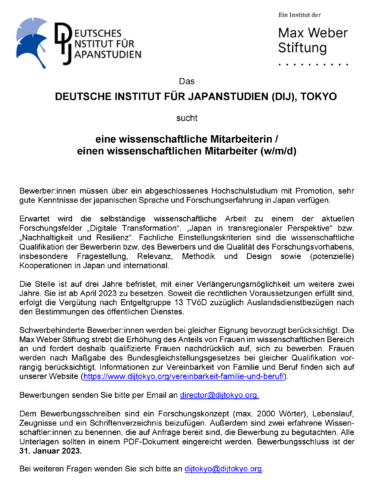 Das DIJ sucht eine wissenschaftliche Mitarbeiterin / einen wissenschaftlichen Mitarbeiter (w/m/d) mit einem abgeschlossenen Hochschulstudium mit Promotion, sehr guten Kenntnissen der japanischen Sprache und Forschungserfahrung in Japan. Erwartet wird die selbständige wissenschaftliche Arbeit zu einem der aktuellen Forschungsfelder „Digitale Transformation“, „Japan in transregionaler Perspektive“ bzw. „Nachhaltigkeit und Resilienz“. Fachliche Einstellungskriterien sind die wissenschaftliche Qualifikation der Bewerberin bzw. des Bewerbers und die Qualität des Forschungsvorhabens, insbesondere Fragestellung, Relevanz, Methodik und Design sowie (potenzielle) Kooperationen in Japan und international. Die Stelle ist auf drei Jahre befristet, mit einer Verlängerungsmöglichkeit um weitere zwei Jahre. Sie ist ab April 2023 zu besetzen. Bewerbungsfrist ist der 31. Januar 2023. Die Ausschreibung und Details finden Sie hier.
Das DIJ sucht eine wissenschaftliche Mitarbeiterin / einen wissenschaftlichen Mitarbeiter (w/m/d) mit einem abgeschlossenen Hochschulstudium mit Promotion, sehr guten Kenntnissen der japanischen Sprache und Forschungserfahrung in Japan. Erwartet wird die selbständige wissenschaftliche Arbeit zu einem der aktuellen Forschungsfelder „Digitale Transformation“, „Japan in transregionaler Perspektive“ bzw. „Nachhaltigkeit und Resilienz“. Fachliche Einstellungskriterien sind die wissenschaftliche Qualifikation der Bewerberin bzw. des Bewerbers und die Qualität des Forschungsvorhabens, insbesondere Fragestellung, Relevanz, Methodik und Design sowie (potenzielle) Kooperationen in Japan und international. Die Stelle ist auf drei Jahre befristet, mit einer Verlängerungsmöglichkeit um weitere zwei Jahre. Sie ist ab April 2023 zu besetzen. Bewerbungsfrist ist der 31. Januar 2023. Die Ausschreibung und Details finden Sie hier.
Japan-Stipendien für Promovierende
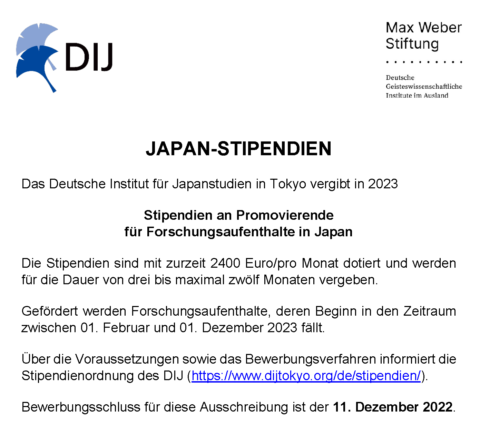 Für das Jahr 2023 vergibt das DIJ wieder attraktive Stipendien zur Förderung von Forschungsaufenthalten in Japan im Rahmen von Promotionsvorhaben. Die Stipendien sind mit zurzeit 2400 Euro/Monat dotiert und werden für die Dauer von drei bis maximal zwölf Monaten vergeben. Gefördert werden Forschungsaufenthalte, deren Beginn in den Zeitraum zwischen 1. Februar und 1. Dezember 2023 fällt. Über die Voraussetzungen sowie das Bewerbungsverfahren informiert unsere Stipendienordnung. Bewerbungsschluss für diese Ausschreibung ist der 11. Dezember 2022.
Für das Jahr 2023 vergibt das DIJ wieder attraktive Stipendien zur Förderung von Forschungsaufenthalten in Japan im Rahmen von Promotionsvorhaben. Die Stipendien sind mit zurzeit 2400 Euro/Monat dotiert und werden für die Dauer von drei bis maximal zwölf Monaten vergeben. Gefördert werden Forschungsaufenthalte, deren Beginn in den Zeitraum zwischen 1. Februar und 1. Dezember 2023 fällt. Über die Voraussetzungen sowie das Bewerbungsverfahren informiert unsere Stipendienordnung. Bewerbungsschluss für diese Ausschreibung ist der 11. Dezember 2022.
Barbara Holthus to deliver keynote lecture at AJJ 2022 conference
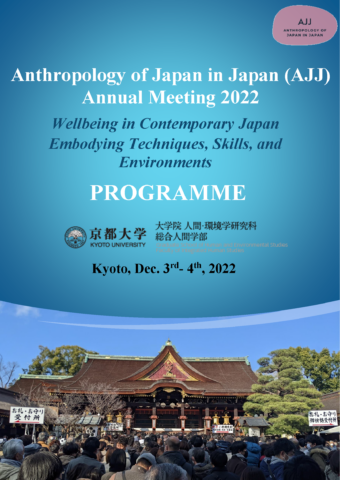
DIJ deputy director Barbara Holthus and Wolfram Manzenreiter (University of Vienna) will deliver the keynote lecture at the Anthropology of Japan in Japan (AJJ) Annual Meeting at Kyoto University on December 3, 2022. Their presentation „The Social DNA of Happiness: Looking back, looking ahead“ will outline the main research foci and results in a field that has become increasingly informed by findings from genetics, sociology, and anthropology. It will also introduce findings from their own studies in the field of happiness and well-being in Japan, including the relationality of well-being and happiness in rural Japan; life satisfaction among parents with young children and in social-movements; a new research tool to illustrate the multidimensionality of well-being in interviews. Looking ahead, their presentation will address the need for more anthropological engagement in this world of permanent flux, instability, threatened democracies, climate crisis, and the Covid-19 pandemic.
Starke DIJ-Präsenz beim Japan-Besuch von Bundespräsident Steinmeier
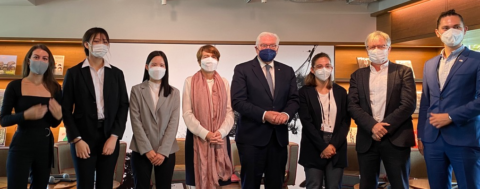 Mehrere Forscher und Forscherinnen des DIJ nahmen in der vergangenen Woche an Veranstaltungen im Rahmen des Japan-Besuchs von Bundespräsident Frank-Walter Steinmeier und seiner Frau Elke Büdenbender teil. Zu den zentralen Anliegen ihres Aufenthaltes zählten gesellschaftlicher Zusammenhalt und Inklusion. DIJ-Direktor Franz Waldenberger (im Foto 2. von rechts) moderierte eine Diskussionsrunde zum Thema Freiwilligenarbeit in Deutschland und Japan, zu der der Bundespräsident und seine Frau junge engagierte Volunteers eingeladen hatten. Im DAWN Avatar Robot Café berichtete Sozialwissenschaftlerin Celia Spoden zusammen mit Kentarō Yoshifuji, CEO des OryLabs und Entwickler der OriHime, einer Delegation um Frau Büdenbender, wie der OriHime-Avatar die Selbstständigkeit, Freiheit und gesellschaftliche Partizipation von körperlich eingeschränkten Menschen unterstützt. Am Empfang des Bundespräsidenten in der Residenz des Deutschen Botschafters nahmen die stellvertretende Direktorin Barbara Holthus und Sozialwissenschaftlerin Nora Kottmann teil. Am Thementisch zu „Gender equality“ diskutierte Nora mit Frau Büdenbender sowie dem ehemaligen DIJ-Beiratsmitglied Kaori Hayashi (Universität Tokyo), Yuko Hayashi (Universität Yamaguchi) und Karen Makishima (Mitglied des Unterhauses, ehemalige Digitalministerin) über „Starke Frauen in Japan“.
Mehrere Forscher und Forscherinnen des DIJ nahmen in der vergangenen Woche an Veranstaltungen im Rahmen des Japan-Besuchs von Bundespräsident Frank-Walter Steinmeier und seiner Frau Elke Büdenbender teil. Zu den zentralen Anliegen ihres Aufenthaltes zählten gesellschaftlicher Zusammenhalt und Inklusion. DIJ-Direktor Franz Waldenberger (im Foto 2. von rechts) moderierte eine Diskussionsrunde zum Thema Freiwilligenarbeit in Deutschland und Japan, zu der der Bundespräsident und seine Frau junge engagierte Volunteers eingeladen hatten. Im DAWN Avatar Robot Café berichtete Sozialwissenschaftlerin Celia Spoden zusammen mit Kentarō Yoshifuji, CEO des OryLabs und Entwickler der OriHime, einer Delegation um Frau Büdenbender, wie der OriHime-Avatar die Selbstständigkeit, Freiheit und gesellschaftliche Partizipation von körperlich eingeschränkten Menschen unterstützt. Am Empfang des Bundespräsidenten in der Residenz des Deutschen Botschafters nahmen die stellvertretende Direktorin Barbara Holthus und Sozialwissenschaftlerin Nora Kottmann teil. Am Thementisch zu „Gender equality“ diskutierte Nora mit Frau Büdenbender sowie dem ehemaligen DIJ-Beiratsmitglied Kaori Hayashi (Universität Tokyo), Yuko Hayashi (Universität Yamaguchi) und Karen Makishima (Mitglied des Unterhauses, ehemalige Digitalministerin) über „Starke Frauen in Japan“.
DIJ founding director receives prestigious Japanese Studies award
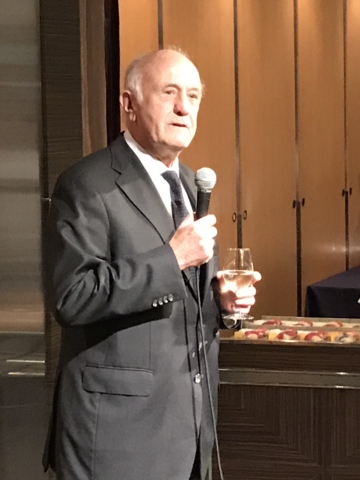
DIJ founding director Josef Kreiner has been announced winner of the International Prize in Japanese Studies 2022 awarded by the Japanese National Institutes for the Humanities (NIHU). „As founding director, Professor Josef Kreiner made a significant contribution to the positive reception and reputation of the DIJ in Japan. The award shows that his research is still held in extremely high esteem today. We are very happy for him and congratulate him very warmly“, said DIJ director Franz Waldenberger. Josef Kreiner is Professor Emeritus of the University of Bonn and Visiting Researcher of Hosei University Research Center for International Japanese Studies. He was instrumental in the negotiations that led to the founding of the DIJ in 1988 and served as its director from 1988 to 1996. The NIHU International Prize in Japanese Studies was established in 2019 with the aim to promote the development of Japanese Studies and deepen the understanding of Japanese culture internationally. The awards ceremony and commemorative lecture will take place on 20 January 2023 at The Japan Academy.
DIJ steps up research cooperation in Western Japan
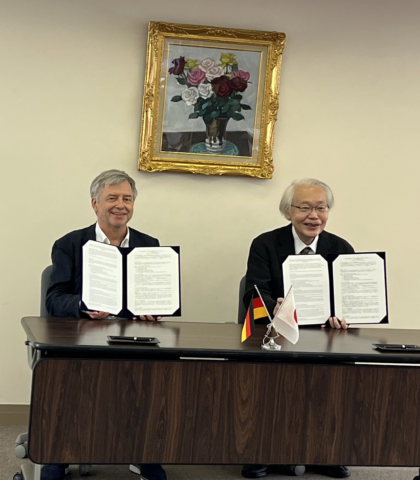 On October 5 and 6, a delegation from the DIJ visited the German Consulate General in Osaka and the International Research Center for Japanese Studies (Nichibunken) in Kyoto to intensify the DIJ’s research cooperation activities in the Kansai region. Ahead of the EXPO 2025 in Osaka, the DIJ is planning to start cooperation projects with the German diplomatic representation in Western Japan next year. At the Nichibunken, DIJ director Franz Waldenberger and Nichibunken’s Director-General Inoue Shōichi signed a memorandum of understanding which extends the current cooperation between both institutes. The DIJ’s membership in the Consortium for Global Japanese Studies, which is administered by the Nichibunken, was also upgraded from observing to full member. The signing event was followed by the Nichibunken Evening Seminar where six DIJ researchers gave presentations on their research projects and exchanged with Nichibunken researchers on the current state and future of Japanese Studies.
On October 5 and 6, a delegation from the DIJ visited the German Consulate General in Osaka and the International Research Center for Japanese Studies (Nichibunken) in Kyoto to intensify the DIJ’s research cooperation activities in the Kansai region. Ahead of the EXPO 2025 in Osaka, the DIJ is planning to start cooperation projects with the German diplomatic representation in Western Japan next year. At the Nichibunken, DIJ director Franz Waldenberger and Nichibunken’s Director-General Inoue Shōichi signed a memorandum of understanding which extends the current cooperation between both institutes. The DIJ’s membership in the Consortium for Global Japanese Studies, which is administered by the Nichibunken, was also upgraded from observing to full member. The signing event was followed by the Nichibunken Evening Seminar where six DIJ researchers gave presentations on their research projects and exchanged with Nichibunken researchers on the current state and future of Japanese Studies.





 Open Access
Open Access 
